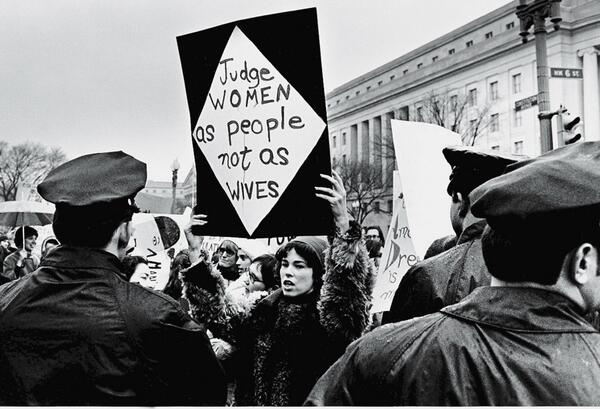A decade of change for women in the Swinging Sixties
"Gradually, without seeing it clearly for quite a while, I came to realize that something is very wrong with the way American women are trying to live their lives today..." Betty Friedan, the influential author behind The Feminine Mystique (1963)In the Sixties, the role of a woman in society was on the road to change. Prior to the Sixties, women, of course, did have the right to vote but did this truly mean they would halt their feminist movement and that all was well and done? Of course not. Abortion was still illegal and not many women progressed to higher education due to settling down to be a housewife. But this did not satisfy a woman any longer. Why should these women remain silent? More so than ever, the Sixties saw a change in how women wanted to be perceived, the 'desperate housewife' image would be wiped away for good and together, they would stand united.
An important figure of course who lead the feminist revolution even further in the Sixties, was an intelligent and influential author named Betty Friedan and boy did she really fight for women's rights. In 1963, she published The Feminine Mystique which posed to be a very influential book, encouraging women to pursue their own paths, breaking away from the altruistic, innocent image they were supposed to portray. She sympathised with women who were housewives who felt trapped in their own homes. This thus sparked the second-wave feminist movement which is still ongoing today.

A protest in Washington DC, January 1969
Friedan become heavily involved in women's groups, she was then convinced to create her own movement thus she helped to form the National Organization for Women (NOW) in 1966. The main aim of the group was "To take action to bring women into full participation in the mainstream of American society now, exercising all privileges and responsibilities thereof in truly equal partnership with men." Friedan was set to ensure that women received the same amount of wages as a man, especially when both genders were doing the same job. Today, we can see that women have more career opportunities thanks to the strong women who pushed for change in the workplace and society. These women wanted to stop bearing children at young ages and to truly fulfil their lives, regaining back their identity. We can see that change was taking place as in 1968, the feminist groups forced American airlines to stop marital discrimination. Women could even begin taking the pill by 1963; 2.5 million American women were actively taking it, meaning they had started to take back control of their bodies and sexual rights. Success! Indeed, there was still a way to go but it was a huge step forward for young women especially.
The influential Betty Friedan, an American feminist and writer
What would we have done without these women pushing for social change? Would women still be denied from universities and stayed within their homes, barricaded from the exciting outside world? The Sixties had started to open doors to women, breaking down discrimination due to constant protesting and influential leaders calling for change. Indeed, abortion became legal in the 1970s, which was another success with civil rights.
As a young female student, I would like to thank these influential, powerful ladies especially Friedan for taking a stand against the stereotypes; they were more than just child bearers and wives, they were human beings who deserved a place in society just like a man. Today I can agree that life for a woman is better due to more access to education, increased participation in parliament and better health care. In the Sixties, it is apparent that women were being more praised and even newspapers expressed that women did have a right to speak up. If I were a woman in the Sixties, I would certainly have spoken up. How else could one continue to accept the stereotypes?
"It would seem by now that it has been amply demonstrated that women are both human beings and women. This is all very well and we have heard it before." The Yale Review on The Feminine Mystique
By Karis Chopping

No comments:
Post a Comment